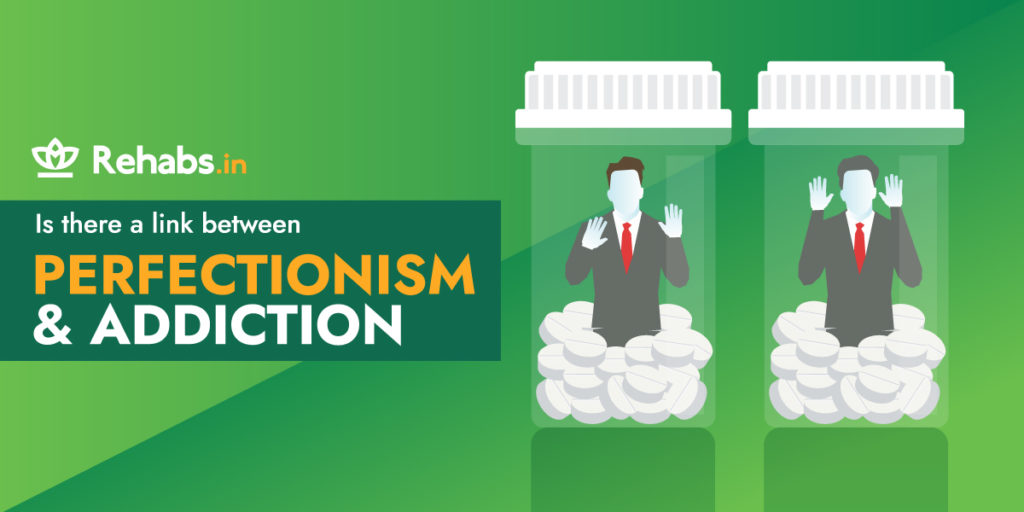Is there a link between perfectionism & addiction

Gaurav had always been an overachiever. He was an academic genius in school and college, as well as a sports enthusiast. By the age of 32, he was the youngest CEO of the international technology company he worked for. So, it came as a shock when news reached his friends and colleagues about his admission to a drug rehab centre. How can a perfectionist like Gaurav ever touch drugs?
It may seem antithetical, but there is a strong link between perfectionism and addiction. According to Anne Wilson Schaef, an American clinical psychologist and author, “Perfectionism is self-abuse of the highest order.” Anne has worked for many decades in the field of addiction recovery and has seen how the pursuit of perfectionism can be destructive. Before we delve further, let’s first understand what perfectionism is.
The Oxford dictionary defines perfectionism as – the refusal to accept any standard short of perfection. Seems like a good motto to live by, right? Who doesn’t want to be the best in whatever they do? However, what is essential to understand is what mindset you have. If your pursuit of perfectionism stems from a positive mindset where you just want to reach your full potential, then there is no problem. However, if your pursuit of perfectionism is because you fear failure, you seek approval from others, or you were raised by your parents to be perfect, then you have a negative mindset, which may not be good for your mental health.
The root cause of perfectionism
We all strive to be perfect. Our teachers, parents, and well-wishers always encouraged us to achieve perfection. Per professors Thomas Curran and Andrew P. Hill from the University of Bath and York St John University, respectively, based on their 30 years of research, there are three reasons why people become perfectionists.
The rise of individual competitiveness: We are living in a world that is obsessed with perfectionism. Our diets have to be perfect; our bodies have to be fit and healthy, our jobs have to be well-paid, and we need to be well-travelled, well-dressed, well-read, and have a wide social circle. Anything less than this, and we are not viewed as a whole individual.
An unfair meritocracy-based society: Today, it doesn’t matter if you are educated. It matters where you get your education from. Having multiple and diverse talents is necessary, and degrees from top schools and colleges make the cut. This can lead to kids developing perfectionism from a very young age.
Controlling parental practices: Most parents want their children to achieve what they couldn’t when they were young. With the ever-increasing pressure to raise high-achieving children, parents can turn their children into perfectionists.
If perfectionism is the way to achieve many of our goals, then why is perfectionism not encouraged by some of the leading minds in the field of psychology?
Gordon Flett and Paul Hewitt are two leading authorities in the field of perfectionism, having studied this topic for decades. According to their landmark study published almost three decades ago, there are three types of perfectionism. “Self-oriented perfectionism, other-oriented perfectionism, and socially prescribed perfectionism.”
In self-oriented perfectionism, one expects themselves to be the best at all times. This can lead to unnecessary anxiety and stress. In other-oriented perfectionism, one expects others around them to be perfect at all times, which can lead to unhappy and unfulfilling relationships leading to loneliness. In socially prescribed perfectionism, one believes that they will be valued by society only if they are perfect at all times, which can lead to social anxiety.
So, can you see the perfectionism trap?
Addiction as a coping mechanism for a perfectionist
The path to perfectionism is a lonely one. You feel isolated and defeated, and you are surrounded by your own constant negative and critical thinking. According to a clinical review on perfectionism published in Clinical Psychology Review, pursuing perfectionism can lead to depression and anxiety. For some, drugs and alcohol may seem the only way to numb this constant mental anguish. However, using drugs and alcohol can worsen these mental problems, and before you know it, you are in a vicious circle of drugs, depression and anxiety, and perfectionism is the cause.
For some, addiction to perfection can be a drug in itself. For e.g., for Someone obsessed with getting six-pack abs, doing an intense workout for three hours straight may give them a high, even though they may physically injure themselves. For someone who wants to have the perfect financial portfolio, investing in a high-risk equity fund may give them a euphoric feeling.
It is essential to understand that pursuing perfectionism can lead to addictive behaviours or substance addiction.
How to overcome perfectionism?
Perfectionism may help you achieve many of your life’s ambitions, but it may not be the best method. Perfectionism in itself is not a bad thing, but maybe it’s an attribute we can expect in products, machines and technologies, not in humans who are unique in their own ways. So, if you are looking at how to get rid of perfectionism, here are some simple methods you can try.
Be self-aware: Understand your strengths and limitations and accept them wholeheartedly.
Make a result-benefit analysis: Is your goal worth the effort? For e.g., is working overtime better than spending quality time with your family?
Nip negative self-talk: The minute the critical voice in your head tells you that you are not good enough, shut it down by focusing on something pleasurable, like listening to music or reading a good book.
Make a list of positives: Perfectionists always tend to look at the negatives, so it’s necessary to make an effort to look at the positives. Write down all the positive things you did in the day in a daily journal.
Prepare yourself to handle criticism: It is essential to understand that constructive criticism is healthy and that it improves performance and leads to excellency. It is nothing personal, and in fact, it is a great way to keep learning.
Surround yourself with positive people: People with a negative attitude can hamper all the progress you have made as a non-perfectionist. Surround yourself with people who have a positive outlook and don’t consider everything a trophy to be earned.
See a counsellor/psychologist: If you are unable to cope on your own and need support then it is advisable to seek the guidance of a counsellor or a psychologist. They can help you to see things in a more positive light.
Seek rehab: If you have turned to drugs and alcohol as a means to cope with your perfectionism then it is time to turn to a rehab treatment center. Depending on your work and life situation, you may choose inpatient or outpatient treatment. At a rehab centre, through detoxification, counselling and therapy, you will be able to cope better with your perfectionism issues.
In closing, perfectionism can lead to addictive behaviours and addiction to substances. Like everything in life, one needs to have a balanced approach toward various life goals, be it education, career, relationships or financial security.
To sum it up, perfectionism looks good only on paper, not humans!
Sources:
Hewitt. P., Flett.G. (1991) Perfectionism in the Self and Social Contexts: Conceptualization, Assessment, and Association with Psychopathology. Journal of Personality and Social Psychology https://psycnet.apa.org/doi/10.1037/0022-3514.60.3.456
Sandoiu, А. (2018). How perfectionism affects your (mental) health. Medical News Today.
Curran. T., Hill. A. (2019) Perfectionism Is Increasing Over Time: A Meta-Analysis of Birth Cohort Differences From 1989 to 2016. American Psychological Association http://dx.doi.org/10.1037/bul0000138
Egan. S., Wade. T., Shafran. R. (2010, May) Perfectionism as a transdiagnostic process: A clinical review. Clinical Psychology Review. ScienceDirect https://doi.org/10.1016/j.cpr.2010.04.009
Krull. E, Guarnotta, E. (2021, July) How Are Perfectionism and Addiction Connected?
Scott. E, Rachel Goldman. R. (2022, June). How to Overcome Perfectionism.















